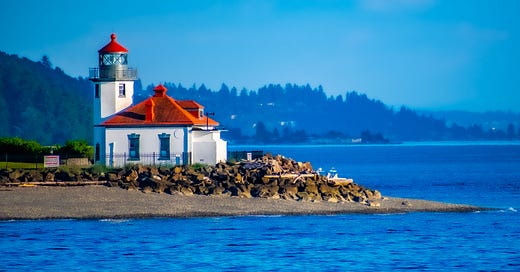Alki Point Lighthouse
sbaqʷabqs or Me-Kwah-Mooks Point, meaning Prairie Point in Puget Salish Lushootseed language
West Seattle’s 1913 Alki Point Lighthouse established on sacred Duwamish ground.
The Arthur Denny Party including ten adults and twelve children, originally from Illinois, intent on finding land for a new settlement, came ashore at Alki Point November 13, 1851 in pouring rain after sailing aboard the schooner Exact from Portland through a November gale. They were greeted by Arthur Denny’s younger brother David who told him: “I wish you hadn’t come!” The reasons for which I’ll save for a future story. Accompanying David Denny was Duwamish Chief Si'ahl (or siʔaɫ in Lushootseed language spelling), better known today as Seattle (the modern anglicization of Sealth, Seathl or See-ahth, the later being the most accurate rendering of the traditional Lushootseed pronunciation).
Chief Seattle and his people were on hand to greet Arthur Denny because they were in winter camps around today’s West Seattle. A major Duwamish village with several longhouses existed around Duwamish Head at the mouth of the Duwamish River. The Duwamish people called the point where the Denny Party landed sbaqʷabqs or Me-Kwah-Mooks Point, meaning Prairie Point in Puget Salish Lushootseed language. The point was a significant burial ground for the Duwamish who kept the land clear of giant Douglas fir trees by centuries of deliberate burning.
British Naval Captain George Vancouver anchored his ship HMS Discovery in the waters he soon named “Puget’s Sound” after one of his officers, near Alki Point, off Blake Island, the birthplace of Chief Seattle, who as a young boy about six years old witnessed the event. Apparently Captain Vancouver never considered the point significant enough to name, even after giving British names to most every other geographical feature in the area. He soon sailed on, looking for the fabled Northwest Passage. The British Hudson’s Bay Company considered Alki Point for a trading post in 1833, but determined that the lack of a reliable source of drinking water made the site unsuitable from a defensive standpoint. Naval Lieutenant Charles Wilkes of the United States Exploring Expedition named the point Point Roberts in 1841, after one of his officers. At some point after the Denny landing, the point came to be known as Battery Point, most likely in a military connotation, either because of the 1856 Battle of Seattle, part of the 1855-1856 Puget Sound Wars with Native Americans not including Chief Seattle and the Duwamish, or lingering fear of British incursion, culminating in the “Pig War” of 1859.
In a flush of wishful thinking, the Denny Party settled on the name New York for their new settlement, the home of several members of the party, including Leander (Lee) and his younger brother Charles Terry. When other settlers in the area laughed at the presumption, the Denny Party added the Chinook Jargon word Alki (originally pronounced Al-kee, now pronounced Al-keye) meaning “By and By” or New York Eventually.
After a damp and miserable winter, which the Denny Party survived only because of the kindness of Chief Seattle and his people, Arthur, David, and most of the other members of the original Denny Party fled across Elliott Bay (named by Lieutenant Charles Wilkes for another one of his officers) to found the new townsite of Seattle (originally called Duwamps) at the site of today’s Pioneer Square. The town’s founders soon renamed Duwamps to be Seattle in honor of Chief Seattle (another story for another time).
Tired of his wilderness adventure, Lee Terry abandoned New York Alki and Washington Territory completely, returning to his original New York, leaving his younger brother Charles Terry as virtually sole inhabitant of the Alki settlement. Realizing New York Alki would never become New York, he platted a townsite on the Duwamish burial ground in 1853 called simply Alki. Two streets, Front and First, ran along the beach. He platted six blocks between the two streets of eight lots per block. Eventually ten buildings were constructed, including two stores and a sawmill at today’s Alki Beach. The lack of an adequate port doomed the fledgling town of Alki in its competition against the new town of Seattle. After a few years, Charles Terry gave up his town of Alki and moved over to Seattle to rejoin the Denny Party. The story of what happened to Alki next must wait for another time.





